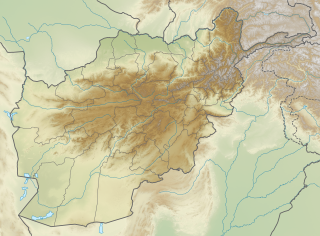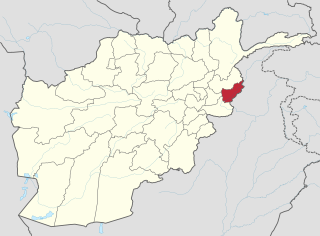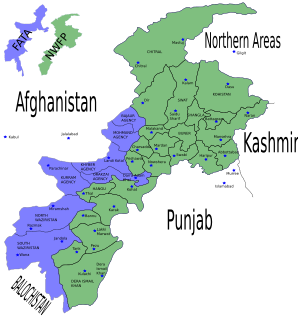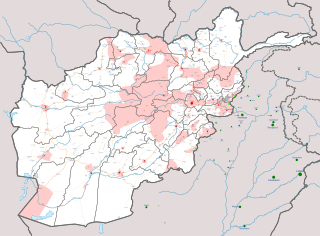 W
WThis article covers the Afghan history between the Taliban's conquest of Kabul and their establishing of the Islamic Emirate of Afghanistan on 27 September 1996, and the U.S. and U.K. invasion of Afghanistan on 7 October 2001: a period that was part of the Afghan civil war that had started in 1989, and also part of the war in Afghanistan that had started in 1978.
 W
WOperation Anaconda was a military operation that took place in early March 2002 as part of the War in Afghanistan. CIA paramilitary officers, working with their allies, attempted to destroy al-Qaeda and Taliban forces. The operation took place in the Shahi-Kot Valley and Arma Mountains southeast of Zormat. This operation was the first large-scale battle in the post-2001 War in Afghanistan since the Battle of Tora Bora in December 2001. This was the first operation in the Afghanistan theater to involve a large number of U.S. forces participating in direct combat activities.
 W
WThe Battle of Wanna was a March 2004 military engagement between the Pakistan Army and members of Osama Bin Laden's al-Qaeda at Azam Warsak, near the South Waziristan town of Wanna. The army troops and intelligence paramilitary soldiers faced an estimated ~500 al-Qaeda foreign fighters holed up in several fortified settlements, the fighting ended with 17 soldiers dead.
 W
WThe Camp Chapman attack was a suicide attack by Humam Khalil Abu-Mulal al-Balawi against the Central Intelligence Agency facility inside Forward Operating Base Chapman on December 30, 2009. One of the main tasks of the CIA personnel stationed at the base was to provide intelligence supporting drone attacks in Pakistan. Seven American CIA officers and contractors, an officer of Jordan's intelligence service, and an Afghan working for the CIA were killed when al-Balawi detonated a bomb sewn into a vest he was wearing. Six other American CIA officers were wounded. The bombing was the most lethal attack against the CIA in more than 25 years.
 W
WThis article covers a part of the contemporary Afghan history that started between 28 April 1992, the day that a new interim Afghan government was supposed to replace the Republic of Afghanistan of President Mohammad Najibullah, and the Taliban's conquest of Kabul establishing the Islamic Emirate of Afghanistan on 27 September 1996.
 W
WThe following addresses the events in Northern Afghanistan between April 2009 and 2014. While this part of the country had long been relatively peaceful compared to the all-out war zones of the south and east, tensions would flare up again in 2008 when the German soldiers deployed to the area came under attack more often, leading to the deaths of the several soldiers. Previously hindered by national caveats, the deteroriating security situation prompted the German-led Regional Command North to launch a series of operations to take on the rising insurgency. Concerted operations began after an insurgent attack on PRT Kunduz within minutes of German Chancellor Angela Merkel's departure from a visit. Within two years, the German presence would be doubled and additional reinforcements from the American ISAF contingent were called in, including heavy German armoured vehicles and US aviation assets, allowing for a more aggressive approach towards the insurgency.
 W
WThe Battle of Do Ab took place in Nuristan province, Afghanistan on 25 May 2011. In the battle, a scout platoon from the 1st Battalion, 133rd Infantry Regiment, United States Army, 20 Afghan soldiers, and two United States Air Force Tactical Air Control Party (TACP) operators and one Law Enforcement Professional (LEP) were ambushed by an estimated 400-500 Taliban near the village of Do Ab. With assistance from close air support, the coalition forces repulsed the ambush, killing approximately 270 Taliban. The coalition forces suffered no casualties.
 W
WGarmsir is the center of Garmsir District in Helmand Province, Afghanistan. It is situated on the eastern bank of the Helmand River on 31.1167°N 64.2000°E at 714 m altitude and 63 km southwest of Lashkargah. The major road at Garmsir is Route 605. The hospital is called Hazar Juft Comprehensive Health Clinic.
 W
WThe Battle of Khas Oruzgan occurred when a combined Australian, American, and Afghan patrol was ambushed by up to 200 Taliban fighters near the village of Khaz Oruzgan. The infamous battle was one of the most intense for Australian forces since the Vietnam war at the time.
 W
WThe Kohat Tunnel is a 1.9-kilometre-long highway tunnel under the Khigana Mountains between Kohat District of Khyber Pakhtunkhwa and Frontier Region Kohat in the Federally Administered Tribal Areas of Pakistan. The tunnel carries northbound and southbound traffic along N-55 National Highway under the Kohat Pass. The tunnel is also referred to as the Pak-Japan Friendship Tunnel, as the tunnel was constructed in assistance with the Economic Cooperation Fund of Japan.
 W
W2014 Kunar Offensive refers to a 2014 armed conflict of the ongoing War in Afghanistan, between the Afghan Army and a terrorist group, Tehrik-i-Taliban Pakistan (TTP). It occurred in the Dangam district of eastern Kunar province, in Afghanistan bordering on Pakistan.
 W
WThe Battle of Mirali was a bloody military engagement occurred between 7 October and 10 October 2007 and involved Taliban militants and Pakistani soldiers around the town of Mirali, Pakistan, the second biggest town in the semi-autonomous region on the border with Afghanistan.
 W
WMohmand Offensive also known as Operation Brekhna is a Pakistani military operation against the Tehrik-i-Taliban in the Mohmand Agency area of the Federally Administered Tribal Areas that began in 2009. It is part of the ongoing War in North-West Pakistan.
 W
WOperation Herrick is the codename under which all British operations in the War in Afghanistan were conducted from 2002 to the end of combat operations in 2014. It consisted of the British contribution to the NATO-led International Security Assistance Force (ISAF), and support to the American-led Operation Enduring Freedom (OEF). Since 2003, Operation Herrick increased in size and breadth to match ISAF's growing geographical intervention in Afghanistan.
 W
WThe Operation Sirat-e-Mustaqeem , was a Pakistan Army operation in Bara Tehsil of Khyber Agency, Federally Administered Tribal Areas. The operation was commenced on June 28, 2008, and was halted by the Army on July 9, 2008, after liberating Bara Tehsil from the terrorist. On July 9, 2008 another operation, codenamed Zarbe-Kaleem, was launched in Hangu district.
 W
WOperation Toral is the codename for British presence within Afghanistan post-2014 as part of NATO's Resolute Support Mission. UK forces have two major tasks: training and mentoring Afghan Forces, and providing force protection for NATO advisors via the Kabul Security Force/Kabul Protection Unit.
 W
WThe Operation Zalzala, was a Pakistan Army military offensive manhunt and a counter-insurgent operation that was commenced on January 18 of 2008. The operation concluded with mixed results as the army had successfully captured the area, but the army was failed to capture or kill Qari Hussain, the main objective of the operation.
 W
WOperation Zarb-e-Azb was a joint military offensive conducted by the Pakistan Armed Forces against various militant groups, including the Tehrik-i-Taliban Pakistan (TTP), the Islamic Movement of Uzbekistan, the East Turkestan Islamic Movement, Lashkar-e-Jhangvi, al-Qaeda, Jundallah and the Haqqani network. The operation was launched on 15 June 2014 in North Waziristan along the Durand Line as a renewed effort against militancy in the wake of the 8 June attack on Jinnah International Airport in Karachi, for which the TTP and the IMU claimed responsibility. As of 14 July 2014, the operation internally displaced about 929,859 people belonging to 80,302 families from North Waziristan.
 W
WThe Orakzai and Kurram offensive also known as Operation Khwakh Ba De Sham is a Pakistani military operation against the Tehrik-i-Taliban in the Orakzai Agency and Kurram Agency area of the Federally Administered Tribal Areas that began on 23 March 2010. It is part of the ongoing War in North-West Pakistan.
 W
WThe insurgency in Khyber Pakhtunkhwa, also known as the War in North-West Pakistan, is an armed conflict involving Pakistan, and armed militant groups such as the Tehrik-i-Taliban Pakistan (TTP), Jundallah, Lashkar-e-Islam (LeI), TNSM, al-Qaeda, and their Central Asian allies such as the ISIL–Khorasan (ISIL), Islamic Movement of Uzbekistan, East Turkistan Movement, Emirate of Caucasus, and elements of organized crime.
 W
WPewar its 16 km far from the capital city Parachinar of Kurram Agency, and the one of the village near to parachinar Federally Administered Tribal Areas of Pakistan. Pewar is situated on a neck of Pakistani territory south of Peshawar, that juts into Paktia Province of Afghanistan. It is the closest point in Pakistan to Kabul and borders on the Tora Bora region of Afghanistan. Turi, Bangash, Orakzai, Zazai(Jaji), Mangal and Para Tsamkani are the major tribes in Pewar,Parachinar. Pewar has four seasons. Pewar is very famous for its fresh fruits, fresh vegetables and snowfall.
 W
WRazmak is one of the three subdivisions of North Waziristan District in Pakistan, the other two being Mirali and Miranshah. The inhabitants are almost exclusively Pashtuns.
 W
WThe Taliban insurgency began after the group's fall from power during the 2001 War in Afghanistan. The Taliban forces are fighting against the Afghan government, formerly led by President Hamid Karzai, now led by President Ashraf Ghani, and against the US-led International Security Assistance Force (ISAF). The insurgency has spread to some degree over the Durand Line border to neighboring Pakistan, in particular the Waziristan region and Khyber Pakhtunkhwa. The Taliban conduct low-intensity warfare against Afghan National Security Forces and their NATO allies, as well as against civilian targets. Regional countries, particularly Pakistan, Iran, China and Russia, are often accused of funding and supporting the insurgent groups.
 W
WThe War on terror, also known as the Global War on Terrorism and U.S. War on Terror, is an international military campaign launched by the United States government after the September 11 attacks. The targets of the campaign are primarily Sunni Islamic fundamentalist armed groups located throughout the Muslim world, with the most prominent groups being Al-Qaeda, the Islamic State, the Taliban, Tehrik-i-Taliban Pakistan, and the various franchise groups of the former two organizations. The naming of the campaign uses a metaphor of war to refer to a variety of actions that do not constitute a specific war as traditionally defined. U.S. president George W. Bush first used the term "war on terrorism" on 16 September 2001, and then "war on terror" a few days later in a formal speech to Congress. In the latter speech, George Bush stated, "Our enemy is a radical network of terrorists and every government that supports them." The term was originally used with a particular focus on countries associated with al-Qaeda. The term was immediately criticised by such people as Richard B. Myers, chairman of the Joint Chiefs of Staff, and more nuanced terms subsequently came to be used by the Bush administration to publicly define the international campaign led by the U.S. While it was never used as a formal designation of U.S. operations in internal government documentation, a Global War on Terrorism Service Medal was issued.
 W
WThe Afghanistan conflict is a series of wars that has been fought in Afghanistan since 1978. Starting with the Saur Revolution military coup, an almost continuous series of armed conflicts has dominated and afflicted Afghanistan. The wars include:The Soviet–Afghan War began in 1979 and ended in 1989. The Soviet Army invaded the country to secure the ruling People's Democratic Party of Afghanistan (PDPA) following large waves of rebellion against the regime. Soviet troops along with the allied Afghan Army fought against rebel factions mostly known collectively as the "Afghan mujahideen", whose main backers were the Soviet Union's Cold War enemies the United States, United Kingdom, and Pakistan. The Soviet Union was forced to withdraw its troops in 1989. The Afghan Civil War (1989–1992) was the continuing war between the government and rebels, but without the involvement of Soviet troops. The Soviet Union nevertheless continued to financially support the Afghan government in its fight, and likewise rebel factions continued receiving support from the United States and Pakistan. The Soviet-backed Afghan government survived until the fall of Kabul in 1992. The Afghan Civil War (1992–1996) began when infighting between the mujahideen rebel factions, after taking Kabul and establishing the Islamic State of Afghanistan, escalated into another full blown conflict. Violent wars were fought between different occupying factions in Kabul, and the city experienced heavy bombardment from them. Each of these were supported by an outside power, such as Pakistan, Iran, or Saudi Arabia, who were seeking influence in Afghanistan. This conflict ended in 1996 after the Taliban, a relatively new militia backed by Pakistan and enforced by several thousand al-Qaeda fighters from Arab countries, took Kabul. The Afghan Civil War (1996–2001) started immediately after the Taliban's capture of Kabul which involved a new military-political resistance force called Northern Alliance fighting against the Taliban and their partially recognized Emirate. Throughout this period the Taliban were in control of almost all of the country, as the Northern Alliance fought most of the time on the defense. The Alliance's leader was assassinated by al-Qaeda members on September 9, 2001. The United States invasion of Afghanistan started on October 7, 2001. The United States sought to remove the Taliban from power as they were hosting al-Qaeda terrorists and camps, who were the main suspects of the September 11 attacks. The United States fought the Taliban from the air and provided support to Northern Alliance ground troops, who successfully drove the Taliban away from most of the country by December 2001. The invasion also marked the start of the United States's War on Terror. The War in Afghanistan (2001–present) is the continuous incumbent war in Afghanistan, where the main conflict consists of Afghan Army troops, backed by additional United States troops, fighting against insurgents of the Taliban and sporadically other groups as well. NATO has also been involved in this war.
 W
WZabul is one of the 34 provinces of Afghanistan, located in the south of the country. It has a mostly rural population of about 289,300. Zabul became an independent province from neighbouring Kandahar in 1963. Historically, it was part of the Zabulistan region. Qalat serves as the capital of the province.